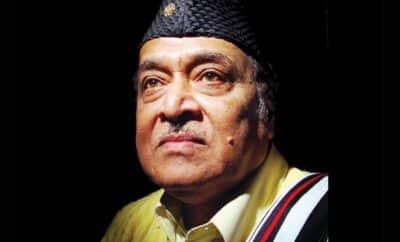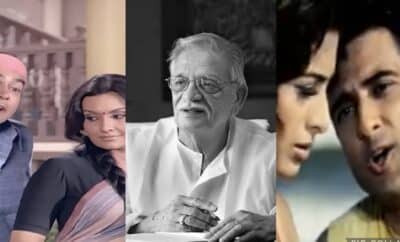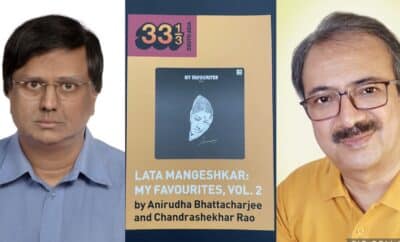Song Sketch
Seene Mein Jalan – Gaman – Despair in the City of Dreams
Mumbai is probably the most unique city in India; the city of stark contrasts where the rich pursue their riches and the poor struggle even to live hand-to-mouth; the city where the dreams of many begin and the dreams of many others end. It is bizarrely balanced on the disparities. Despite all the harsh realities, it keeps on enticing people from all across the country, like ants to a sugarloaf. Once in Mumbai, some get addicted to it, while many are stuck like an insect in a cobweb. And it’s too late by the time one realises that there is no return!
Gaman (1978) is the story of one such migrant from Uttar Pradesh, who arrives in Mumbai (then Bombay) leaving his family behind and tries to find a foothold in this city of dreams. Awestruck on arrival, he is soon perplexed on getting acquainted with the realities and ends up in frustration eventually, torn between the charm of the city on one side and the distressed family in the faraway homeland on the other.
The ghazal “Seene mein jalan, aankhon mein toofan sa kyun hai?” from the movie nicely depicts the perplexity of the migrant Ghulam Hasan (played by Farooq Shaikh). As the song described the thoughts that are playing on Ghulam Hasan’s mind while he is seen driving a taxi in the streets of Mumbai for livelihood, the song plays in the background. The song is composed by Jaidev, sung by Suresh Wadkar and penned by Shahryar.
The visual of the song starts with a traffic light turning orange and then red. The vehicles stop and swarm of people starts crossing the road. A number of double decker city buses are seen one after the other, all jam-packed with people; with a large number of people having “missed the bus” still waiting on the bus stop. Prelude comprising guitar, santoor and flute accompanies the scene.
The sight of a plethora of people like pickle packed in a pot, leaves him in wonderment. He starts thinking –
Seene mein jalan, aankhon mein toofan sa kyun hai?
Is shahar mein har shakhs pareshan sa kyun hai?
Why is everyone in this city carrying a smouldering fire in the mind and storm in the eyes? Why is everyone so anxious? Everyone is continuously on the run for livelihood, in search of happiness; and everyone looks so uneasy and frustrated.
After an interlude consisting of a touching piece of sarod and an image of Ghulam’s wife (Smita Patil) on the background of the city traffic, the first stanza starts –
Dil hai to dhadakne ka bahaana koi dhoondhe
Patthar ki tarah behis-o-bejaan sa kyun hai?
If all these are human beings, and not just machines, why aren’t their hearts beating? why are those hearts looking for an excuse to beat? Why are those hearts insensitive and lifeless like rocks?
We then see a panoramic view of the Arabian Sea that takes us gradually to Marine drive – a real ocean on one side and an ocean of people on the other. Ironically, everyone in this ocean of people is lonely and isolated. An interlude comprising santoor and flute accompanies this magnificent visual, which is followed by the second stanza –
Tanhai ki ye kaunsi manzil hai rafeekon?
Ta had-e-nazar ek bayaabaan sa kyun hai?
Which is this weird destination where there is nothing but loneliness? Why is there an unending wilderness in sight everywhere?
After another brief interlude composed of flute and sarod, his thoughts continue in the third stanza –
Kya koi nayi baat nazar aati hai hum mein?
Aaina humein dekh ke hairaan sa kyun hai?
Has anything changed in my appearance off late? Why is the mirror taken aback by my reflection?
He himself is not able to withstand his transformation from a rural man living happily albeit with moderate wherewithal to a migrant struggling to find a foothold in the unforgiving urban atmosphere where he would always remain a stranger, an outsider.
The words from the prolific pen of Shaharyar so concisely describe the yin of the life in Mumbai, which is generally overshadowed by and overlooked due to its glamour! This was most probably his first film as a lyricist.
Jaidev’s composition based on raag Bageshri stays true to his style of richly textured astounding and mellifluous compositions. Even without a heavy and fancy orchestration, the composition leaves and everlasting impression and remains among Jaidev’s most popular compositions. Jaidev rightfully won National Award for the soundtrack of this film.
Suresh Wadkar is suave and outstanding in his rendition as always. His effortless rendition and confidence make it is hard to believe that this was among his first few Hindi film songs, alongside the songs in Paheli (1977). Though the unique texture of his voice may not be considered as suitable for all heroes and songs of all types, it certainly makes his voice suitable for special songs such as this. Jaidev had offered Suresh Wadkar this song after the latter won the Sur-Singar competition in 1976 which was judged by Jaidev amongst others. And Suresh Wadkar proved his choice right!
Even after more than four decades, nothing has changed in Mumbai (except the change of name from Bombay to Mumbai) and this musical and poetic masterpiece remains as relevant to the life in Mumbai as it was then.



